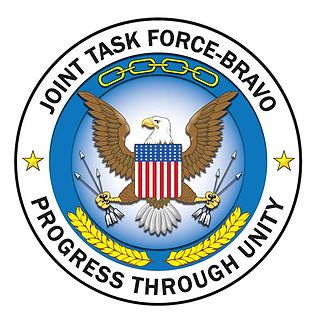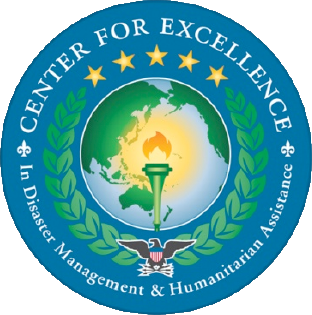
A Provincial Reconstruction Team (PRT) was a unit introduced by the United States government, consisting of military officers, diplomats, and reconstruction subject matter experts, working to support reconstruction efforts in unstable states. PRTs were first established in Afghanistan in early 2002, and as of 2008 operate there as well as in Iraq. While the concepts are similar, PRTs in Afghanistan and Iraq had separate compositions and missions. Their common purpose, however, was to empower local governments to govern their constituents more effectively.

Civil-Military Co-operation (CIMIC) is the means by which a military commander connects with civilian agencies active in a theatre of operations.
Operation Urban Warrior was a United States Marine Corps program created as an exercise meant to plan and test Military Operations on Urbanized Terrain (MOUT) and urban warfare in general. It was developed in the mid 1990s by the Marine Corps Warfighting Laboratory partly in response to growing problem on inner-city fighting, and especially made urgent following the Battle of Mogadishu in 1993.

The Directorate-General for European Civil Protection and Humanitarian Aid Operations (ECHO), formerly known as the European Community Humanitarian Aid Office, is the European Commission's department for overseas humanitarian aid and for civil protection. It aims to save and preserve life, prevent and alleviate human suffering and safeguard the integrity and dignity of populations affected by natural disasters and man-made crises.
A humanitarian crisis is defined as a singular event or a series of events that are threatening in terms of health, safety or well being of a community or large group of people. It may be an internal or external conflict and usually occurs throughout a large land area. Local, national and international responses are necessary in such events.
The United Nations Office for the Coordination of Humanitarian Affairs (OCHA) is a United Nations (UN) body formed in December 1991 by General Assembly Resolution 46/182. The resolution was designed to strengthen the UN's response to complex emergencies and natural disasters. Earlier UN organizations with similar tasks were the Department of Humanitarian Affairs (DHA), and its predecessor, the Office of the United Nations Disaster Relief Coordinator (UNDRO). In 1998, due to reorganization, DHA merged into OCHA and was designed to be the UN focal point on major disasters. It is a sitting observer of the political debate United Nations Development Group.

The Defense Logistics Agency (DLA) is a combat support agency in the United States Department of Defense, with more than 26,000 civilian and military personnel throughout the world. Located in 48 states and 28 countries, DLA provides supplies to the military services and supports their acquisition of weapons, fuel, repair parts, and other materials. The agency also disposes of excess or unusable equipment through various programs.
Civil Affairs (CA) is a term used by both the United Nations and by military institutions, but for different purposes in each case.
The Coordinator of Government Activities in the Territories (COGAT) is a unit in the Israeli Ministry of Defense that engages in coordinating civilian issues between the Government of Israel, the Israel Defense Forces, international organizations, diplomats, and the Palestinian Authority. It is the main organ, remaining of the mostly defunct Israeli Civil Administration, which had governed the West Bank and the Gaza Strip between 1981 and 1994.

Joint Task Force-Bravo is a forward-based expeditionary joint task force operating as U.S. Southern Command’s (USSOUTHCOM) lead forward element in the Central America (CENTAM) region to promote stability and security and counter transnational and transregional threat networks (C-T3N). JTF-Bravo operates out of Soto Cano Air Base, Honduras, located 10 miles south of the city of Comayagua and 50 miles north of the capital city of Tegucigalpa.
ACTED, formerly 'Agency for Technical Cooperation and Development', is a French humanitarian NGO established in 1993. It is a non-governmental, non-political and non-profit organization committed to supporting vulnerable populations around the world. ACTED’s teams work in 36 countries, responding to emergency situations, whilst also supporting rehabilitation and development. ACTED implements more than 450 projects a year reaching 8 million people, with a c. €200 million budget and more than 400 international staff and 4,300 national staff. It is the second largest French NGO after Médecins Sans Frontières. The headquarters are in Paris, France.

411th Civil Affairs Battalion (Tactical) is a civil affairs (CA) unit of the United States Army. It is based at Danbury, Connecticut. The unit includes Alpha, Bravo, Charlie, Delta and Headquarters (HHC) Companies, all located in Danbury. The battalion has been involved in almost every conflict or major operation since Operation Just Cause in Panama in 1989, most recently serving in the Horn of Africa from 2016 to 2017.
Civil-military coordination is efforts to coordinate activities in peacekeeping or humanitarian assistance missions during United Nations (UN) operations. Civil-military cooperation seeks to gain unity of effort among military forces, police agencies and civilian organizations engaged in such operations.
Civil affairs in the United States Armed Forces are civil-military operations (CMO) use of military force to control areas seized from the enemy, minimize insurgency or civil interference with military operations, and maximize civil support for military operations. CMO is conducted in conjunction with combat operations during wartime and becomes a central part of a military campaign in counter-insurgencies. CMO operations have been in frequent use since 1775 by the Army, as well as more recently by the Navy and Marine Corps.
A joint civil-military operations task force, or JCMOTF, is a task organized military unit with the functional purpose of conducting civil-military operations. A JCMOTF generally contains civil affairs type forces with specialists in areas such as nation building, humanitarian assistance, public works and utilities, public safety and health, public education, governance and economics. A military commander may form a JCMOTF during war or disaster relief to stabilize and rebuild an area. A commander may also employ a JCMOTF during peace to perform humanitarian or nation assistance. A JCMOTF may also contain civilian governance, development or stabilization specialists.

The Center for Excellence in Disaster Management and Humanitarian Assistance (CFE) is a direct reporting unit to the U.S. Indo-Pacific Command (USINDOPACOM) and principal agency to promote disaster preparedness and societal resiliency in the Asia-Pacific region. As part of its mandate, CFE facilitates education and training in disaster preparedness, consequence management and health security to develop domestic, foreign and international capability and capacity.

The Maritime Civil Affairs and Security Training Command (MCAST) provides personnel, trains, equips and deploys U.S. Navy Sailors for a Task Force Commander to establish and enhance relations between military forces, governmental and nongovernmental organizations and the civilian populace. Accomplished in a collaborative manner across the spectrum of operations in the maritime environment, MCAST Command executes civilian to military operations and military to military training, as directed, in support of security cooperation and security assistance requirements.
Many countries around the world have civil defense organizations dedicated to protecting civilians from military attacks and providing rescue services after widespread disasters. In most countries, civil defense is a government-managed and often volunteer-staffed organization.
The Office of U.S. Foreign Disaster Assistance (OFDA) is an organizational unit within the United States Agency for International Development (USAID) that is charged by the President of the United States with directing and coordinating international United States government disaster assistance.

All Partners Access Network (APAN), formerly called Asia-Pacific Area Network, is a United States Department of Defense (USDOD) social networking Website used for information sharing and collaboration. APAN is the premier collaboration enterprise for the USDOD. The APAN network of communities fosters multinational interaction and multilateral cooperation by allowing users to post multimedia and other content in blogs, wikis, forums, document libraries and media galleries. APAN is used for Humanitarian Assistance and Disaster Relief, Exercise Planning, Conferences and Work Groups. APAN provides non-governmental organizations (NGOs) and U.S. partner nations who do not have access to traditional, closed USDOD networks with an unclassified tool to communicate.















